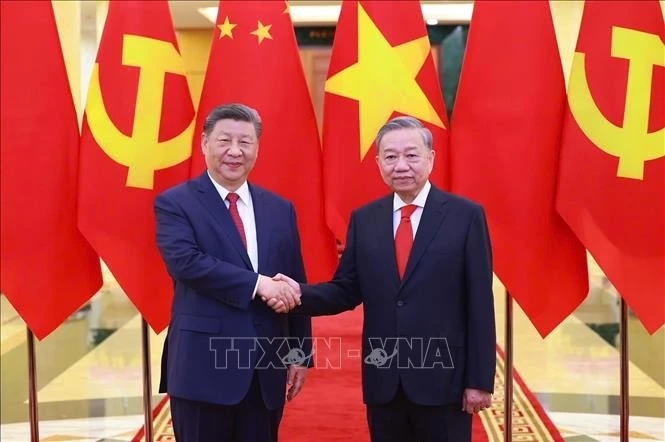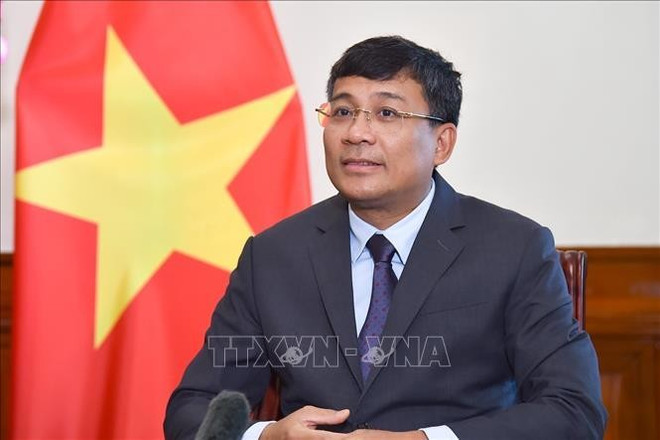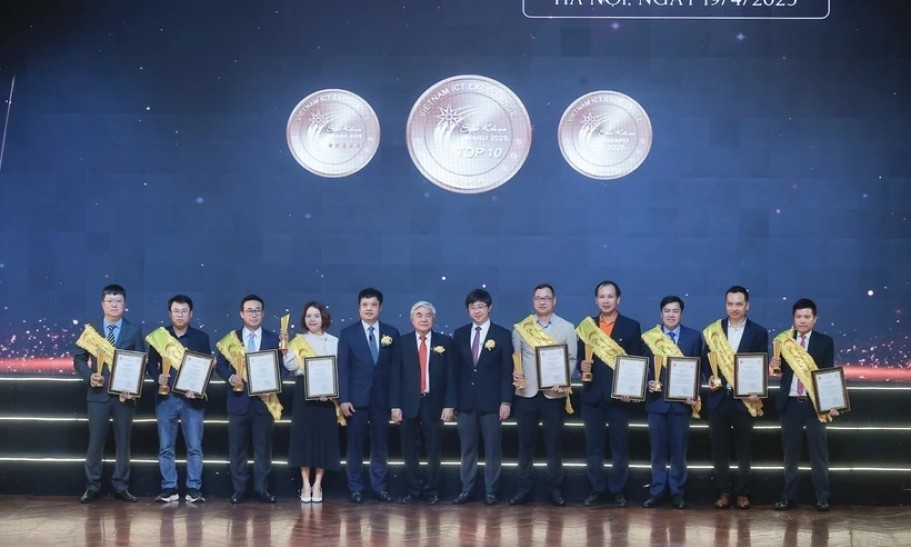Top Chinese leader’s state visit to Vietnam holds historical significance: official
The visit has contributed to strengthening political trust and providing guidance for the stable and healthy development of bilateral relations amidst the complex international and regional situations.

The state visit to Vietnam by Party General Secretary and President of China Xi Jinping from April 14 to 15 carries historical significance and gains a great success, according to Standing Deputy Minister of Foreign Affairs Nguyen Minh Vu.
Talking to the media about the trip's outcomes, Vu affirmed that the trip is the most important political event for bilateral relations this year and became even more significant as it took place in the Year of Vietnam – China Humanistic Exchange and amid the 75th anniversary of their diplomatic ties (1950–2025). On the very first day of the visit, for the first time, Party General Secretary To Lam wrote an article posted on the People’s Daily - the organ of the Communist Party of China Central Committee. At the same time, the top Chinese leader also had an article published on Vietnam’s Nhan Dan (People) newspaper.
General Secretary Lam, State President Luong Cuong, Prime Minister Pham Minh Chinh, and National Assembly Chairman Tran Thanh Man all held highly productive meetings with the Chinese leader, during which they engaged in extensive discussions on bilateral relations as well as regional and international issues of common concern.
The two sides’ leaders affirmed that the visit marked a new milestone in the friendly neighbourliness, the Comprehensive Strategic Cooperative Partnership, and the Vietnam – China community with a shared future which carries strategic significance.
The diplomat said that the remarkable outcomes of this historic visit are clearly reflected in several aspects. Firstly, the trip has helped maintain high-level strategic exchanges between the two countries after Vietnam consolidated the leadership of its Party, State, Government, and National Assembly agencies. It has contributed to strengthening political trust and providing guidance for the stable and healthy development of bilateral relations amidst the complex international and regional situations.
Secondly, during this visit, the sides agreed on the key directions, measures, and priorities to promote substantive cooperation in the coming period. In particular, they emphasised their commitment to enhancing substantive cooperation in a more quality-driven, effective, and practical manner; and fostering new "bright spots" of cooperation in areas where Vietnam has demand for and China has strengths in, such as standard-gauge railways, trade in agricultural products, science and technology, artificial intelligence (AI), education and training, digital economy, and green economy.
Thirdly, the visit resulted in the largest-ever number of reached agreements in the most diverse range, including a joint statement and 45 cooperation documents between ministries, agencies, and localities of both sides. The 45 signed cooperation agreements are a telling figure, demonstrating the vibrant, substantive, and diverse nature of the collaboration, with increasingly intertwined and mutual benefits between the two countries, stated Vu.
The outcomes achieved during the visit are diverse and outstanding, with positive and long-term impact on the bilateral relations and the development of each country, especially as both are entering a new era, he affirmed.

To effectively implement these results, the official proposed both sides adhere closely to the spirit of the Joint Statement and the common perceptions of their high-level leaders, recommending that they should make use of the Year of Humanistic Exchange as an opportunity to further deepen the Comprehensive Strategic Cooperative Partnership, promote the building of a Vietnam – China community with a shared future which carries strategic significance, and advance mutually beneficial cooperation with higher quality to bring more tangible benefits to their peoples.
Attention should be paid to maintaining regular delegation exchanges and contacts at all levels to continue strengthening and elevating strategic trust to a higher level.
It is necessary to elevate substantive cooperation in key areas to concretise the Joint Statement and the agreements reached during the visit, with the top priority in the current phase given to accelerating the connection of the countries' development strategies, starting with infrastructure connectivity such as standard-gauge railways, expressways, and smart border gate infrastructure. They should enhance collaboration in emerging fields such as AI, clean energy, green and digital economy, and 5G technology application.
Vu also advised the two countries to step up people-to-people exchanges and reinforce the social foundation for building the Vietnam – China community with a shared future; while maintaining close coordination, cooperation, and mutual support at multilateral mechanisms and forums of which both are members.
The Deputy FM also highlighted the importance of coordinating to effectively manage the land border, better controlling and resolving differences, and jointly maintaining peace and stability at sea.
The two sides should adhere to the high-level common perceptions, actively seek fundamental and long-term solutions acceptable to both sides and in line with the "Agreement on Basic Principles Guiding the Settlement of the Sea-related Issues" between the two countries, as well as international law, including the 1982 United Nations Convention on the Law of the Sea (UNCLOS). They should also promote discussions on the delimitation of the waters outside the mouth of the Gulf of Tonkin and work toward meaningful progress in maritime cooperation for joint development, said Vu./.
 Loading
Loading  Tiếng Việt
Tiếng Việt English
English 中文
中文


